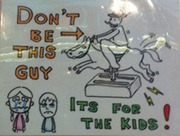 Every workplace has “that guy.” The employee who can’t quite seem to keep his mouth shut, who says inappropriate things, the one you know will someday lead to a harassment lawsuit. (Hint: If you can’t think of who “that guy” is in your workplace, it might be you).
Every workplace has “that guy.” The employee who can’t quite seem to keep his mouth shut, who says inappropriate things, the one you know will someday lead to a harassment lawsuit. (Hint: If you can’t think of who “that guy” is in your workplace, it might be you).
Dunn v. Automotive Finance Corp. (M.D. Tenn. 7/2/13) is about “that guy,” but with a twist. “That guy” was Robert Dunn, a manager terminated by Automotive Finance Corp. for making inappropriate racially based comments during a social gathering following a training session. Present for Dunn’s alleged comments were four other white managers, along with one African-American assistant manager, Rick Hopkins. Several of those present complained about Dunn’s comments; the company investigated and fired Dunn.
Dunn was accused of making three racially insensitive comments:
- A comment that Tiger Woods was being judged by a white man’s standard, as compared to Michael Vick, who went to prison.
- A comment that his mother was Indian and not allowed to sit with White people back in the day.
- In reference to a statement that Hopkins would be the next manager at the company, Dunn said, “Good luck. Have you seen a family photo of this place?” and that the company had very few African-American managers “walking the halls.”
What was Dunn’s explanation when a co-worker expressed her discomfort at his statements? “That’s just how I am, because I’m a country boy.” When that same co-worker complained to management about Dunn’s comments; the company investigated and fired him.
Here’s the twist. Dunn sued for retaliation, claiming that Title VII protected his comment about a lack of upward mobility for African-Americans within the company. Incredibly, the court agreed that Dunn’s statement at least presented a question for a jury to determine as to whether that comment is protected from retaliation under Title VII.
Dunn made one comment or a set of comments that could reasonably be construed as protected activity: complaining in front of the Branch Managers that AFC discriminated on the basis of race with regard to promoting black managers. There are competing accounts as to precisely what Dunn said, although the witnesses who recall the incident appear to agree that Dunn accused AFC of being a racist company and/or that Dunn stated that AFC would not promote Hopkins because he is black…. The fact that Dunn made this comment in front of a black Assistant Branch Manager and that it made the white employees “uncomfortable” was just a side effect of speaking his mind that the company had and would continue to practice illegal racial discrimination.
The company argued that Dunn was merely seeking “to insulate himself from the consequences of [his] inappropriate conduct by concocting a post hoc rationalization that he had actually engaged in some form of ‘opposition’ activity.” I agree.
Cases like this one undermine the protections offered by the anti-retaliation laws, and send the wrong message to employers. The company fired Dunn because a co-worker complained about inappropriate race-based comments. The employer met is obligation under Title VII to investigate the allegations, and implement corrective measures to ensure that the comments stopped. Yet, the employer got punished for meeting its anti-harassment obligations. If the employer retained Dunn, it could have faced a potential harassment lawsuit. An employer should not have to choose between a harassment lawsuit by an offended employee, or a retaliation lawsuit by an alleged harasser who appears less than genuine in his “complaints.”
This case also is a perfect example of the maxim that any employee can sue at any time for any reason, and helps illustrate my point that because of the risk of lawsuits, employers are exceedingly gun-shy about firing employees.
photo credit: foreverdigital via photopin cc
